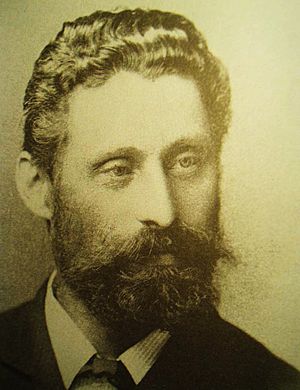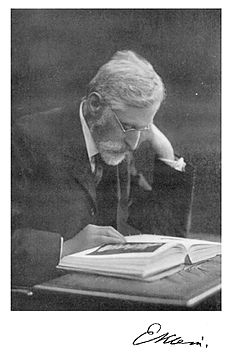Emanuel Edward Klein facts for kids
Emanuel Edward Klein (born October 31, 1844, died February 9, 1925) was a famous bacteriologist. He was born in Croatia and studied in Austria before moving to Britain. Some people call him the "father of British microbiology".
However, much of his work was overshadowed by his strong support for using vivisection (experiments on living animals) in his research. This was a very controversial topic at the time. His English wasn't perfect, and some of his answers during court questions were seen as shocking.
Contents
Life and Early Work
Emanuel Klein was born in Osijek on October 31, 1844. His family spoke German and were not strict about their Jewish faith. His father, who worked with leather, passed away when Emanuel was about fourteen.
After finishing school, he worked as a tutor. At eighteen, he moved to London to help his family. Later, he studied medicine in Vienna, Austria, and became a doctor in 1869.
Moving to England
In 1871, Klein visited England to help translate a German book. Important scientists like John Burdon Sanderson and John Simon were impressed by his knowledge. They invited him to work in London, which he did in 1871.
Klein started working at the Brown Animal Sanatory Institution. By 1873, he became a professor there, studying diseases in animals. He also worked at St Bartholomew's Hospital, teaching anatomy and physiology.
The Vivisection Controversy
In 1873, Klein helped write a book called Handbook for the Physiological Laboratory. This book described experiments on living animals. At the time, this was a common practice in Vienna, where he had studied.
However, a movement against animal experiments, called the anti-vivisection movement, strongly protested these methods. In 1875, after Klein became a member of the Royal Society, a special group called the Royal Commission looked into the issue.
While other scientists were careful with their answers, Klein spoke very directly. Some people thought this was because his English wasn't very good. The media made him seem like a villain, and he became the main target of the anti-vivisectionists. This public outcry led to the creation of the Cruelty to Animals Act 1876, a law to protect animals.
Klein continued to work at the Brown Institution until 1897. During this time, he taught many students, including famous people like Francis Darwin and Frederick Treves.
Impact on Popular Culture
Because of the controversy, Klein became very well-known, but not always in a good way. Several novels from that time, like Paul Faber, Surgeon (1878) and Heart and Science (1883), featured a scientist character based on Klein. These characters often had negative traits, showing how the public viewed him.
Contributions to Microbiology
Klein's training in Europe gave him access to new techniques in microbiology, developed by scientists like Louis Pasteur and Robert Koch. In 1884, he wrote the first major English book on bacteriology.
Cholera and Scarlet Fever Research
In 1884, Klein traveled to India as part of the British cholera commission. His job was to check the findings of Robert Koch, another famous scientist, about the cause of cholera. Klein found the comma-shaped Vibrio cholerae bacteria in water and in sick patients, just as Koch had. However, Klein wasn't fully convinced that this bacteria alone caused the disease.
In 1885, he studied an outbreak of a cow disease that was similar to scarlet fever. He found four types of bacteria during his research, including Streptococcus pyogenes, which is known to cause scarlet fever.
Food Safety and Publications
Klein also studied bacteria in food. He helped create methods for processing and preserving food safely. Out of his 264 scientific papers, almost 200 were about microbiology. Ronald Ross, who later won a Nobel Prize, was one of Klein's students. Klein also wrote a book called Elements of Histology (1883), which is about the study of tissues.
Klein was a founding member of the Medical Research Club in 1891. He also helped edit the Quarterly Journal of Microscopical Science, a scientific magazine.
Personal Life
Emanuel Klein married Sophia Mawley in 1877. They had a son named Bernard and two daughters. Klein was also a good chess player and enjoyed music.
He passed away from pneumonia at his home in Hove on February 9, 1925.
 | Mary Eliza Mahoney |
 | Susie King Taylor |
 | Ida Gray |
 | Eliza Ann Grier |



